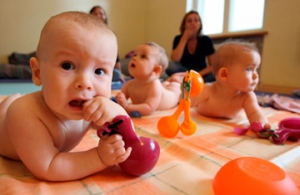Does good education lead to low birth rates? If you are a young, thirty-something, childless couple, you will have probably spent a lot of Christmas fending off questions about the arrival of ‘the first little one.’ This can be very irritating. If you are a South Korean couple these questions may have been particularly annoying. Birth rates have fallen to an all-time low. A recent article says that the quality of their higher education is to blame.
Historically low birth rates in South Korea
There was an interesting story in the Financial Times last week (2nd January 2013), “Low South Korean birth rate raises fears“, concerning low fertility rates in South Korea and the link to education. In 2010, the birth rate sank to an all-time low of 1.2 children per women. This figure is even more stunning when you consider that China has a rate of 1.6 children per woman despite its one child policy.
The writer suggests that couples basically have to decide whether to have just one child and have enough money to educate it or to have more at the risk of giving lower quality school and university. As evidence of this he quotes a 47 year insurance saleswoman who states:
“I spend more than half my income on tutors and childcare expenses – it’s really expensive . . . That’s why I decided to have only one child.”
South Korean’s simply can’t afford to have children anymore.
Of course we all love babies (and particularly other people’s that we can give back after 5 minutes!) so low birth rates seems like a bad thing. The article puts the blame squarely on “a strong cultural emphasis on education” with 75% of the high-school students receiving private tuition and then going on to study at university.
Worrying about education is a universal matter
Every country worries about education and no doubt the cost of tuition is one of the factors that has an influence on the decisions of couples to have a second or third child. However, reasons are multifarious and it is dangerous to define them in isolation.
One study in the UK back in the 1970s attributed declining birth rates to the BBC’s decision to schedule Match of the Day at 10.30pm on a Saturday. The programme was one hour long and gave highlights of the day’s top football (soccer) matches. The researchers claimed that men were staying up to watch this programme rather than well…having an early night. They recommended the programme to be rescheduled. The BBC resisted.
Indeed, the journalist, Simon Mundy, confuses the issue in his article by quoting Lee Jong-wha, an economic advisor to the outgoing South Korean President, Lee Myung-bak. The former says:
“If you attend classes here (at university), there’s virtually no discussion at all. The professor speaks for 99 per cent of the time, and there’s no question-and-answer.”
Though parents may worry about time and cost when bringing up their offspring, it is very unlikely that their immediate concern are about the internal goings on of a university 20 or so years from now. You might just like to imagine the scene in a South Korean bedroom late in the evening.
Him: “Darling, shall we make a baby?”
Her: “Not tonight, dear. Not until our local university has completed an extensive revision of its academic delivery modes and given us some guarantees on a more interactive pedagogical approach.”
That should calm any guy down!
Blaming higher education seems therefore to be rather strange. Probably far more likely are the child care facilities and the cost for the first years of a child life.
Low birth rate in Germany
In Europe, it is Germany that has catastrophically low birth rates. Higher education costs next to nothing in Germany (500 euros per year) and use of tutors is not extensive. Indeed, most Germans are proud of their very egalitarian higher educational structure. The complete opposite of South Korea you might say. So what is the reason there? A Time article of May 2010 brings us back to the same child care issues rather that higher education.
“Many German women decide not to have children because of poor state-run child-care facilities. Most schools in Germany finish earlier than in other parts of Europe — some as early as 1 p.m. — leaving parents struggling to find and afford sufficient day care.”
Higher birth rates in France
Park Geun-hye, South Korea’s new President, has promised to develop state childcare and reduce tuition fees by 50%. Both will be hard to do as they are very costly in difficult economic times. It is likely that the first measure will have a more real impact that the second.

Favorable conditions in France keep its birth rate higher in comparision with other European countries.
France can actually claim to have some good measures in this area. France has one of the highest fertility rates in the industrialized world partly because there it is quite a parent friendly place to live. Health care is set at a low individual cost (paid for by taxes) and child care facilities are plentiful. There are direct fiscal measures to encourage people to have more children. The birth of a third child within a couple leads to a considerable lower taxation rate. If you really want to annoy a French mother you should ask her if she had the third child just to qualify for a tax rebate (though have a heart and do this out of earshot of the poor, innocent child in question!)
South Korea might want to look at some of these. In the long term fewer births are not good for an economy and not just for universities twenty years from now. With fewer children in a country who is going to buy the iPads and the Galaxies of tomorrow and who is going to pay for the retirement of those people who only had the money to raise one child. Individual couples may find that they can’t afford to have children today, but societies will find later that they couldn’t afford not to have them.
See also:
 |
 |
 |
||
|
The Chinese National Holiday: Celebrating the changing generations |
On MBA programme pricing |
|
Children of the (Cultural) revolution: Chinese Higher Education 35 years after Mao’s death
 This week China will quietly commemorate the anniversary of the death of Mao Zedong. On the 9th September 1976, the founder of the Chinese Communist Party died at the age of 82. During that time, Chinese universities have followed the modernization movement within the country in their goal to become world-class institutions. Read more….
This week China will quietly commemorate the anniversary of the death of Mao Zedong. On the 9th September 1976, the founder of the Chinese Communist Party died at the age of 82. During that time, Chinese universities have followed the modernization movement within the country in their goal to become world-class institutions. Read more….
Beyond your borders: Overcoming cultural differences that so often cause conflict
 According to Geert Hofstede “Culture is more often a source of conflict than of synergy. Cultural differences are a nuisance at best and often a disaster.” Patrick Mazzariol, Vice President International Sales at Synchrony, Inc., USA, explains that an international learning strategy, language skills and embracing new cultures are the keys to overcoming this problem. Read more…
According to Geert Hofstede “Culture is more often a source of conflict than of synergy. Cultural differences are a nuisance at best and often a disaster.” Patrick Mazzariol, Vice President International Sales at Synchrony, Inc., USA, explains that an international learning strategy, language skills and embracing new cultures are the keys to overcoming this problem. Read more…
Sex… Past, Present and Future: Confusing your Xs and your Ys
 Across Europe, Business Schools are now getting in the full swing of the new academic year. So comes the moment to deal with subject that is on all business students’ minds and to wonder whether they are really that different to previous generations. Read more…
Across Europe, Business Schools are now getting in the full swing of the new academic year. So comes the moment to deal with subject that is on all business students’ minds and to wonder whether they are really that different to previous generations. Read more…
Stunning beach in South Korea
Free Online News: “Its a first come basis system Haeundae Beach, Busan, South Korea who came first they can take places otherwise find your location via search engine.”
China – Millennial madness
The Economist: “For more than two decades, Mr Yang believed the official version of Mao Zedong’s disastrous economic experiment known as the Great Leap Forward, that it was caused by natural disasters.”
Quality of life in China
Operaviva: “During a business meeting with a foreign trade consultant the usual question popped up: “how is it to live here ?” And the most common answer is: “It’s fantastic ! The quality of life is great”.”























I appreciate how you’ve laid out this issue. I’ve sometimes see low birth rates (particularly in countries that don’t have high mortality rates) and gone, “Well, at least there’s some place to go when we all get overpopulated,” but this does raise some practical concerns for it. This is also evidenced by the fact that China is reconsidering that one child policy for the exact reason stated: who can afford to help their aging parents? Also, you have to love correlations that get turned into major issues when the big picture is excluded.
Thank you for your comment. The one child policy is a big issue in China today but beyond that it is difficult to draw conclusions from what are very personal choices. Many thanks for reading. Mark
Pingback: Work: It’s what you do, not where you are | GlobalEd